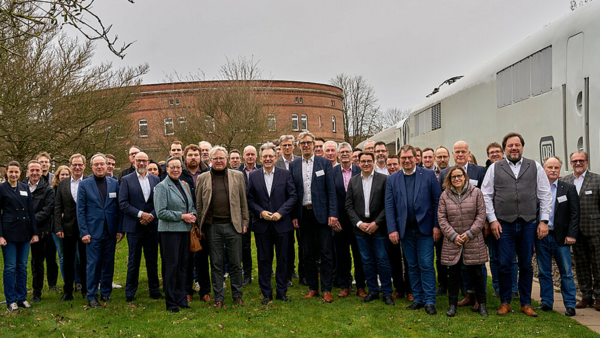The enableATO project will be based at the RailCampus OWL, making Minden one of four locations within the German Center for Future Mobility (DZM). Guests from politics and administration also attended the project launch.
Over the next three years, a strong project consortium of universities, Fraunhofer institutes in the region and companies will be advancing technologies for automated, rail-based mobility concepts and researching and demonstrating interfaces between rail-based mobility and other modes of transport in rural areas. Driverless rail transport systems such as the MONOCAB or the road-rail vehicle will demonstrate automated rail transport in Minden and Extertal. The aim is to use them in a test control operation in the near future. With Prof. Dr. Stefan Witte, Prof. Dr. Ulrich Büker and Prof. Dr. Henning Trsek, several members of the Board of the Institute for Industrial Information Technology (inIT) are also working on automated rail transport.
"This marks a significant step towards sustainable, networked and automated mobility for the future and for rural areas, such as in OWL," said Professor Stefan Witte, Vice President for Research and Transfer at TH OWL and project coordinator at today's project launch. The funding of 12.5 million euros is being provided by the Federal Ministry for Digital and Transport Affairs (BMDV).
The aim of the "enableATO" project is to enable modern ideas for automated rail mobility and their investigation in new rail-based approaches in rural areas. The focus is on technologies related to automated driving such as perception by sensors, approval issues, intelligent maintenance and the demonstration of technologies, e.g. in the MONOCAB. At the same time, initial questions regarding user acceptance are being researched and addressed and the scientific dialog strengthened.
The challenge of transport system transformation is to combine sustainability and efficiency. Automation, autonomous driving, intelligent traffic management, digital connectivity and networked mobility play a central role in this context. The RailCampus OWL as an innovation location for this project provides space for new impulses and makes a decisive contribution to the research and development of new automated mobility approaches for sustainable rail mobility as a socially relevant factor.
Investigating rail-bound mobility at the RailCampus OWL
The RailCampus OWL pools and expands expertise and will create and utilize new things in this project. Various new mobility approaches are being researched and demonstrated there, for example on automated transport with the MONOCAB developed by TH OWL and a two-way vehicle that was initially designed at Bielefeld University of Applied Sciences for logistics applications and can travel on both rail and road. These approaches aim to reactivate unused rail infrastructure and use it sustainably for more individual mobility by rail, but require automation.
Strong partnership for sustainable mobility
The project consortium is made up of renowned partners. It includes Bielefeld University, Paderborn University, Bielefeld University of Applied Sciences, Technische Hochschule Ostwestfalen-Lippe, DB Systemtechnik GmbH, Wölfel Engineering GmbH + Co. KG, HARTING Technology Group, Pilz GmbH & Co. KG and the Fraunhofer Institutes IEM (Paderborn) and IOSB-INA (Lemgo). Associated partners are WAGO and DB Cargo AG. Together, the partners are contributing extensive expertise and many years of experience to advance the vision of sustainable, networked and automated mobility in rural areas. The enableATO project will make an important contribution to this.


